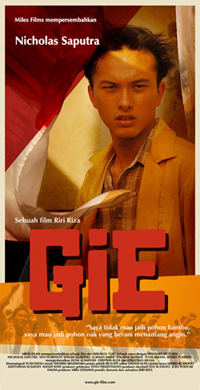Gie
| Gie | |
|---|---|

Theatrical poster for Gie
|
|
| Directed by | Riri Riza |
| Produced by | Mira Lesmana |
| Written by | Riri Riza |
| Starring |
Nicholas Saputra Wulan Guritno Robby Tumewu |
| Distributed by | Sinemart Pictures |
|
Release date
|
14 July 2005 |
|
Running time
|
147 minutes |
| Country | Indonesia |
| Language | Indonesian |
| Budget | ~ Rp10 billion |
Gie is a 2005 Indonesian film directed by Riri Riza. The film tells the story of Soe Hok Gie, a graduate from University of Indonesia who is known as an activist and nature lover. The film is based on a diary Catatan Seorang Demonstran written by Soe himself. The plot of this film is an interpretation of the filmmakers, and scenes portraying Soe's private life may be partly fictionalised for dramatisation.
Soe Hok Gie grew up in a lower-middle class Chinese Indonesian family in Jakarta. In his early teens, young Gie had developed a fascination in concepts and idealisms advocated by world class intellectuals. Combined with a fighter's passion, faithfulness to friends, and a heart filled with genuine care for others and for his country, young Gie grew to become intolerant with injustice, and dreamt of an Indonesia that is truly founded on justice, equality, and righteousness. This passion was frequently misunderstood by others. Even Soe's best friends, Tan Tjin Han and Herman Lantang posed the question "What is all this fighting for?" which Soe would calmly respond with his awareness that freedom has a price tag that must be paid. Soe's motto, as written on the movie poster, is translated as "It is better to be singled out than to surrender to hypocrisy".
Soe's teen and college years was spent under the regime of Indonesia's founding father Sukarno, which was characterised with conflict between the military and the Indonesian Communist Party (PKI). Soe and his friends insisted that they were politically neutral; and as much as Soe has respect for Sukarno as Indonesia's founding father, Soe detested Sukarno's dictatorship which caused the poor and the oppressed to suffer. Soe was well aware of the social inequality, power abuse, and corruption under the government of Sukarno, and courageously spoke out against it in discussion groups, student unions, and wrote sharp criticisms in the media. Soe also abhorred the fact that too many students appeared to others as advocates of positive change, who in fact were just taking advantage of the political situation to make personal gain. This attracted much sympathy as well as opposition. Many interest groups sought Soe to support their campaigns, while many enemies of Soe jump at any opportunity to intimidate him.
...
Wikipedia
